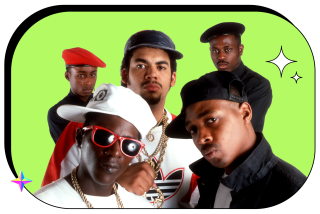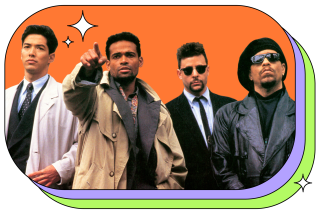Time Warner Refuses to Pull Rap Album
- Share via
Time Warner executives refused to back down from their support of a controversial record by rapper Ice-T at a five-hour shareholders meeting in Beverly Hills on Thursday, despite pleas from more than 20 people, including two wounded policemen and actor Charlton Heston.
In one of the most extraordinary performances of his long career, Heston recited some of the controversial rap lyrics aloud at the meeting, stunning listeners with the sexually explicit words of a rap song that alludes to Tipper Gore’s young nieces.
Heston, who is as renowned for his conservatism as his performance in “The Ten Commandments,” was the first speaker to attack the company for continuing to distribute rapper Ice-T’s compact disc despite the public furor over “Cop Killer” and other songs on the “Body Count” album.
But there was no backing down by Time Warner President Gerald M. Levin in his first meeting with shareholders as co-chief executive of the giant media company. With Chairman Steven J. Ross ailing with cancer, Levin stood at the podium alone, displaying his runner’s endurance as the meeting wore on.
Levin defended the album’s distribution as constitutionally protected free speech, although he said the company wants to hold public forums to air the debate.
About 1,100 people crowded into the Regent Beverly Wilshire Hotel ballroom, including law enforcement and victims’ groups. A few speakers were hissed, but complete silence fell when two blinded police officers described their ordeals as shooting victims.
For some shareholders, the meeting’s tension was eased by the news that the Time Warner board has declared a 4-for-1 common stock split, as well as a 12% increase in the quarterly cash dividend payable on common shares. Levin announced that the additional shares will be issued Sept. 10 to shareholders of record Aug. 24.
The company also issued its second-quarter earnings, boasting improved results in all five divisions. For the first half of 1992, net income was $12 million, contrasted with a loss of $82 million in 1991.
Operating income from filmed entertainment rose to $101 million in the three months ended June 30, compared to $85 million in the same period in 1991, reflecting the summer box-office success of “Lethal Weapon III” and “Batman Returns.”
Seated near the front of the ballroom, Courtney Sale Ross greeted executives and friends of her ailing husband. At her side was filmmaker Steven Spielberg, who said he came to the meeting as the Rosses’ friend.
Noting that his Long Island home is quite close to the Rosses, Spielberg said he sees Ross frequently, and he is sure the Warner chairman is on the mend.
Outside the hotel, a smaller than anticipated protest took place. About 40 police officers from across the country and their backers carried signs bearing the names of officers killed while on duty.
LAPD Detective Ed Auerbach, whose sign listed fallen Los Angeles officers, called the company’s defense of the album “a slap in the face from . . . a lot of corporate fat cats who don’t understand what’s going on out in the street.”
Members of a group called Refuse and Resist! held up banners and placards characterizing the pressure against Time Warner as an act of censorship. A man who identified himself simply as Tehuti argued that the police uproar was an attack against the messenger--Ice-T--not against violence in entertainment.
During the late afternoon, Ice-T was spotted passing the hotel in a car and was photographed flashing an extended middle finger out the window.
Free-lancer Ken Ellingwood contributed to this story.
More to Read
The biggest entertainment stories
Get our big stories about Hollywood, film, television, music, arts, culture and more right in your inbox as soon as they publish.
You may occasionally receive promotional content from the Los Angeles Times.










